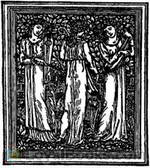|
Books Should Be Free Loyal Books Free Public Domain Audiobooks & eBook Downloads |
|
|
Books Should Be Free Loyal Books Free Public Domain Audiobooks & eBook Downloads |
|
Author Collection |
|---|
By: William Morris (1834 — 1896) | |
|---|---|
 The Wood Beyond the World
The Wood Beyond the World
MANUAL OF SURGERY, OXFORD MEDICAL PUBLICATIONSBY ALEXIS THOMSON, F.R.C.S.Ed.PREFACE TO SIXTH EDITION Much has happened since this Manual was last revised, and many surgical lessons have been learned in the hard school of war. Some may yet have to be unlearned, and others have but little bearing on the problems presented to the civilian surgeon. Save in its broadest principles, the surgery of warfare is a thing apart from the general surgery of civil life, and the exhaustive literature now available on every aspect of it makes it unnecessary that it should receive detailed consideration in a manual for students... | |
 Völsungasaga
Völsungasaga
The 13th century Icelandic Völsungasaga is usually read by people studying the Poetic Edda or Wagner’s Ring – which obscures the fact it is a much better story than practically everything derived from it. A riddle-telling dragon, a broken sword, a hooded mysterious wanderer – cannibalism, incest, mutilation, and sensitive hearts. This is R-rated Tolkien – and the unashamedly archaic Magnússon-Morris translation is up for the adventure.Passages spoken in Old Norse are taken from the edition of Sophus Bugge, Berlin, 1891. | |
 News From Nowhere
News From Nowhere
News from Nowhere (1890) is a classic work combining utopian socialism and soft science fiction written by the artist, designer and socialist pioneer William Morris. In the book, the narrator, William Guest, falls asleep after returning from a meeting of the Socialist League and awakes to find himself in a future society based on common ownership and democratic control of the means of production. In this society there is no private property, no big cities, no authority, no monetary system, no divorce, no courts, no prisons, and no class systems... | |
 The Well at the World's End, Book 1: The Road unto Love
The Well at the World's End, Book 1: The Road unto Love
The Well at World's End is thought to be one of the first examples of an entirely fictional fantasy world, and has greatly influenced later fantasy writers such as C.S. Lewis and J.R.R. Tolkien. The book follows the travels of Ralph, a prince of a tiny country, as he disobeys his fathers wishes and runs away from home to adventure in the world, and seek out the fabled Well at World's End, said to grant eternal youth to those who drink from it. | |
 The House of the Wolfings
The House of the Wolfings
William Morris (1834-1896) was a writer, illustrator and medievalist from the Romantic period and associated with other renowned authors of the time such as Dante Rossetti. His fascination with ancient Germanic and Norse people dominated his writings, the first to be set in an entirely invented fantasy world and which helped to establish the fantasy genre. The House of Wolfings (1890), some argue, is a demonstration of Morris' socialism as the society described, though not an utopia, is clan-based, elects leaders and makes decisions in clan tribal meetings... | |
 Signs of Change
Signs of Change
In the 1880s William Morris, the artist and poet famously associated with the Arts and Crafts movement, left the Liberal Party and threw himself into the Socialist cause. He spoke all over the country, on street corners as well as in working men's clubs and lecture halls, and edited and wrote for the Socialist League's monthly newspaper. Signs of Change is a short collection of his talks and writings in this period, first published in 1888, covering such topics as what socialism and work should be, and how capitalism and waste developed. | |
 The Story of the Volsungs, (Volsunga Saga) With Excerpts from the Poetic Edda
The Story of the Volsungs, (Volsunga Saga) With Excerpts from the Poetic Edda
| |
 The Tale of Beowulf Sometime King of the Folk of the Weder Geats
The Tale of Beowulf Sometime King of the Folk of the Weder Geats
| |
 The Art and Craft of Printing
The Art and Craft of Printing
| |
 The Story of Sigurd the Volsung
The Story of Sigurd the Volsung
| |
 The Hollow Land
The Hollow Land
| |
 Hopes and Fears for Art
Hopes and Fears for Art
| |
 The Earthly Paradise
The Earthly Paradise
| |
 The Water of the Wondrous Isles
The Water of the Wondrous Isles
| |
 The Story of Sigurd the Volsung and the Fall of the Niblungs
The Story of Sigurd the Volsung and the Fall of the Niblungs
| |
 A Dream of John Ball; and, a king's lesson
A Dream of John Ball; and, a king's lesson
| |
 The Story of Grettir the Strong
The Story of Grettir the Strong
| |
 The Roots of the Mountains; Wherein Is Told Somewhat of the Lives of the Men of Burgdale
The Roots of the Mountains; Wherein Is Told Somewhat of the Lives of the Men of Burgdale
| |
 Child Christopher and Goldilind the Fair
Child Christopher and Goldilind the Fair
| |
 The Story of the Glittering Plain; or, the land of Living Men
The Story of the Glittering Plain; or, the land of Living Men
| |
 Old French Romances
Old French Romances
| |
 The World of Romance being Contributions to The Oxford and Cambridge Magazine, 1856
The World of Romance being Contributions to The Oxford and Cambridge Magazine, 1856
| |
 The Sundering Flood
The Sundering Flood
| |
 The Pilgrims of Hope
The Pilgrims of Hope
| |
 A Selection from the Poems of William Morris
A Selection from the Poems of William Morris
| |
 The Tables Turned or, Nupkins Awakened. A Socialist Interlude
The Tables Turned or, Nupkins Awakened. A Socialist Interlude
| |
 Love is enough
Love is enough
LibriVox volunteers bring you 16 recordings of Love is enough by William Morris. This was the Weekly Poetry project for February 17, 2013.William Morris was an English textile designer, artist, writer, and libertarian socialist associated with the Pre-Raphaelite Brotherhood and English Arts and Crafts Movement. He was instumental in establishing the modern fanasty genre, and thus influenced writers such as J. R. R. Tolkien. Morris also wrote and published poetry, fiction, and translations of ancient and medieval texts. | |
 Well at the World's End, Book 2: The Road Unto Trouble
Well at the World's End, Book 2: The Road Unto Trouble
In The Well at the World's End, Ralph of Upmeads, youngest son of the King of Upmeads, leaves home without permission and sets out looking for adventure. When he hears rumors of a well that exudes water with magical properties, he is intrigued and begins his quest. Along the way, he travels through various towns and wildernesses and meets -- and is sometimes led astray by -- a host of interesting people including a mysterious knight, a beautiful woman who may be a goddess, a treacherous servant, a brave tavern wench, a barbarian warrior, a solitary sage, and a sadistic king... | |
 Well at the World's End: Book 3: The Road to The Well at the World's End
Well at the World's End: Book 3: The Road to The Well at the World's End
In The Well at the World's End, Ralph of Upmeads, youngest son of the King of Upmeads, leaves home without permission and sets out looking for adventure. When he hears rumors of a well that exudes water with magical properties, he is intrigued and begins his quest. Along the way, he travels through various towns and wildernesses and meets -- and is sometimes led astray by -- a host of interesting people including a mysterious knight, a beautiful woman who may be a goddess, a treacherous servant, a brave tavern wench, a barbarian warrior, a solitary sage, and a sadistic king. Book 3 continues this journey. | |
 Story of the Glittering Plain
Story of the Glittering Plain
In this early example of the modern high fantasy genre, Hallblithe, a warrior of the House of Raven, sets out in pursuit of the pirates who have kidnapped his troth-plight maiden, the Hostage. Kidnapped himself, Hallblithe sails to the Isle of Ransom in the company of the giant Puny Fox. Travelling onward to the Land of the Glittering Plain, he spurns the offer of eternal youth and the hand of the King's daughter to continue the search for his beloved. First published in 1890 in the English Illustrated Magazine, The Story of the Glittering Plain was re-published in 1973 as the first volume of the celebrated Newcastle Forgotten Fantasy Library... | |
 Prose Romances from the Oxford and Cambridge Magazine (1856)
Prose Romances from the Oxford and Cambridge Magazine (1856)
William Morris initiated the genre of high fantasy in a number of short novels written toward the end of his life. But he had already experimented with the genre much earlier in stories written for the Oxford and Cambridge Magazine, which he launched as a student at Oxford University in 1856. Published posthumously in book form, and reprinted as the eighth volume of the celebrated Newcastle Forgotten Fantasy Library under the title Golden Wings and other Stories, these short stories make an entertaining collection that stands up well against Morris's mature work. - Summary by Phil Benson | |
 Well at the World's End: Book 4: The Road Home
Well at the World's End: Book 4: The Road Home
In The Well at the World's End, Ralph of Upmeads, youngest son of the King of Upmeads, leaves home without permission and sets out looking for adventure. When he hears rumors of a well that exudes water with magical properties, he is intrigued and begins his quest. Along the way, he travels through various towns and wildernesses and meets -- and is sometimes led astray by -- a host of interesting people including a mysterious knight, a beautiful woman who may be a goddess, a treacherous servant, a brave tavern wench, a barbarian warrior, a solitary sage, and a sadistic king. Book 4 finishes his adventure. - Summary by Kristingj | |
 Child Christopher and Goldilind the Fair
Child Christopher and Goldilind the Fair
A prose romance set in the forested kingdom of Oakenrealm, where a squirrel can go about from end to end without touching the ground, in which Christopher wins the fair queen Goldilind, discovers his true identity and reclaims his birthright. In this tale of valour and romance, William Morris reimagined the medieval lay of Havelock the Dane. Child Christopher was originally published by Morris's Kelmscott Press and reprinted in the 1970s as the twelfth volume of the celebrated Newcastle Forgotten Fantasy Library. - Summary by Phil Benson | |
 Roots of the Mountains
Roots of the Mountains
The Roots of the Mountains was the second in a projected series of three historical novels set in a pre-medieval Germanic world . It follows the themes of House of the Wolfings, which was published in the same year, into a later generation. A loose alliance of Dalesmen, Woodlanders and Shepherds who have lived in peace around the valley of Burgdale for so long that they barely remember war, find their peace disturbed by the Sons of the Wolf and the invading Dusky Men. Morris’s exploration of the social and economic organization of this fictional pre-medieval world reflects his socialism; the figure of the Dusky Men reflects the racial politics of his times... | |
 Chants for Socialists
Chants for Socialists
As well as being influential in the Arts and Crafts Movement and writing numerous poems and novels, William Morris was deeply involved in political reform. These poems, the earliest of which were first collected in 1885, reflect his socialist beliefs. | |
 Summer Dawn
Summer Dawn
volunteers bring you 16 recordings of "Summer Dawn" by William Morris. This was the Weekly Poetry project for July 10, 2022. ------ When this poem was first published in 1856 it had no title. Subsequently, the 1858 edition gave the sonnet its title of "Summer Dawn." And it is a sonnet, though it does not follow traditional English or Italian models. Perhaps Morris was giving hint of the Provençal 'alba.' These poems in their early form were conversations between two lovers. The requirement is that each stanza end with the word 'alba' [dawn]. Morris ends lines five and eleven this way. - Summary by KevinS | |